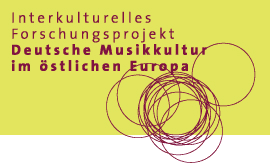Case study South East Europe: Intangible dimensions of the music culture of the Danube Swabians and Transylvanian Saxons
The current research interest is to be understood as a continuation or execution of the thematic focus "The intangible cultural asset music in the 'life world' and 'monument' field of tension". As a follow-up to the more strongly theory-driven questioning approach of the previous year the focus is now directed towards a specific case study: towards the historiographical and culture of remembrance dimensions of the music culture of the Germans in (and from) the Danube-Swabian and Transylvanian-Saxon settlement areas and thus towards the multi-ethnically and inter-ethnically flavoured scenario of the South East European area.
In addition to exemplary archive studies, which ask for sources (in the sense of a search for traces), in which aspects of music are documented as lived cultural practice, the project would particularly like to initiate new field studies which permit insights into the present music culture of the German minorities or of the Danube-Swabian and Transylvanian-Saxon remembrance communities (e.g. on the spot in Hungary, Serbia, Rumania or also Germany). In a further step the question of specific possibilities of the re-presentation of music and music culture in the museum or exhibition context is posed and these are to be explored from a cultural science perspective.
Within the context of this research project an international symposium took place from 11th to 13th November 2010 in Bonn, devoted to the topic "Music in the 'life world': Immaterial dimensions of the music culture of Germans in (and from) the South-East European settlement areas". To find out more, please take a look at the workshop programme.
|

